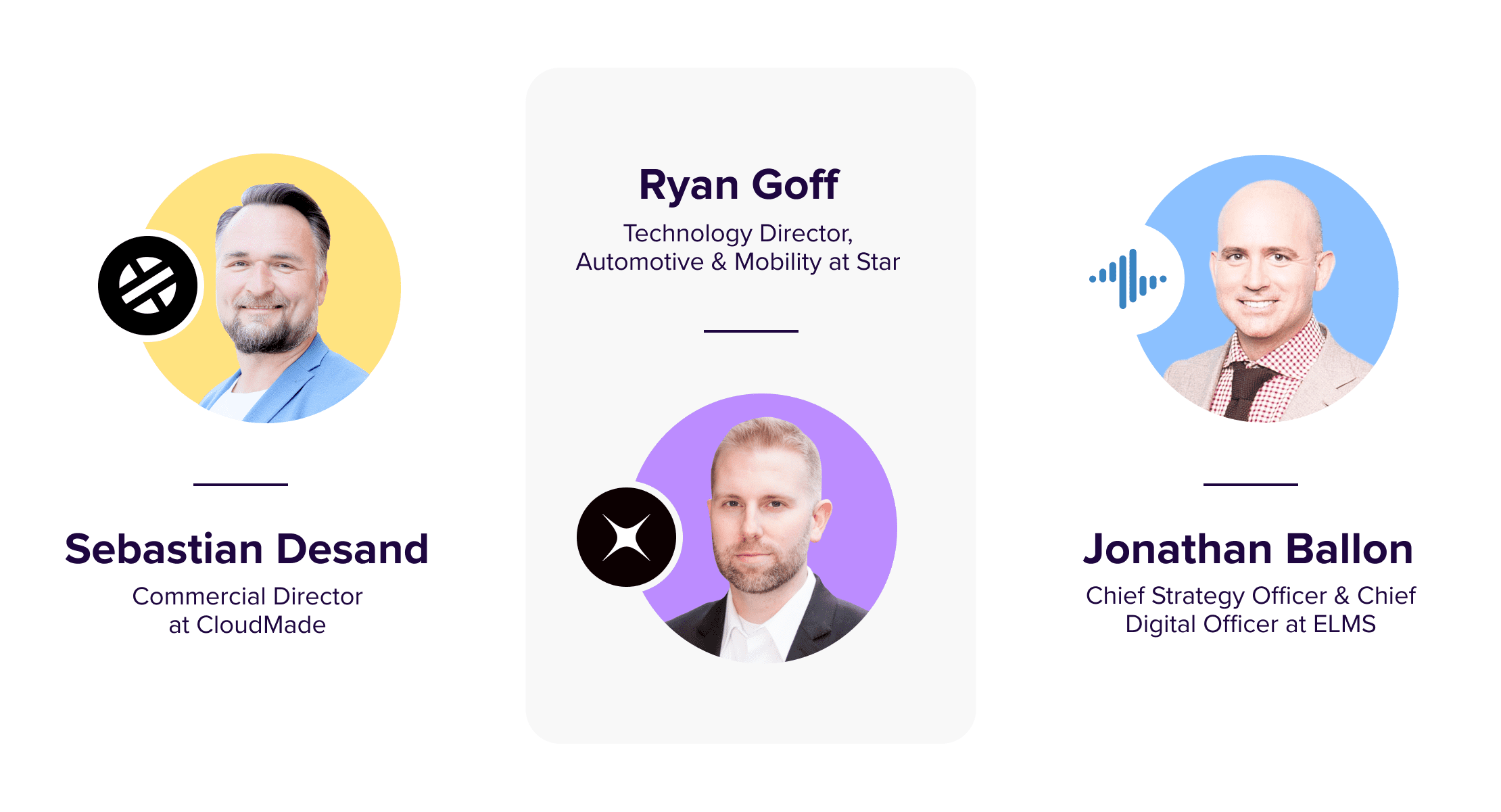
North or south. East or west. Urban or rural. Few people haven’t felt the crunch that’s taken hold of the global supply chain. The fleet management industry employs nearly 4 million commercial driver’s license holders who deliver 70% of all freight worth $11.5 trillion in the US alone. It is crucial for enabling our modern lives, but it’s going through immense challenges and transformations. The secret for navigating this turbulent era is taking a holistic look into tech-fueled fleet management.
We gathered experts from ELMS, Cloudmade and Star to discuss how technology enables major fleet costs centers to add more value and accelerate growth. By focusing on three horizons — connectivity, smartness and intelligence — fleets can evolve to become more valuable, productive and resilient.
The benefits of better fleet management
These three experts dialed in on several fleet management examples of harnessing new technologies and approaches. Aside from reducing pollution and traffic, Jonathan describes how the better use of data and artificial intelligence in fleet management “will unlock enormous amounts of productivity for operators and impact everything for the customer experience.”
We’ve all been given a repair window of 4, 6 or even 8 hours for a maintenance call! What if that could be narrowed down to a very specific timeframe? Or how about full track and trace on packages from across the value chain? What about a true understanding of environmental impact?
This is just the beginning as fleet management tech innovations extend into better driver and road safety, reduced insurance costs, preventative maintenance and even improvements in the ever-important utilization ratio.
Fleet owners rightfully pay close attention to the cost of ownership. Their businesses consist of literally huge capital assets that need to be utilized while operational expenses must be kept low.
This is a delicate balancing act even in the best of times. Add to it the complexities of the post-pandemic era, driver shortages and additional challenges, and you can easily see why now is such a pivotal innovation moment.
Jonathan explains how “the advent of connectivity and data and software, like the idea and concept of fleet management, is ripe and open to expand. There are many areas where that can work toward zero unplanned downtime” and accelerate fleet management cost savings.
For example, using Big Data and advanced analytics, fleet managers can go beyond more effective route planning and into minute-by-minute coordination with receiving facilities to shave valuable time from the unloading process. A minute saved here and there even for smaller fleets can equal immense overall gains.
In short, technology enables the things that used to be cost centers to add more value to the company.
Subscribe on Apple Podcast | Subscribe on Spotify
From connected vehicles to true intelligence
Today’s vehicles are packed with more technology than ever. As Ryan elaborates, fleet management connectivity comprises the information we can gather from vehicles, including the “use of telemetry and AI to improve safety, tracking, monitoring, compliance and security.” All these come together as critical components of fleet management solutions.
But much of this data is often siloed either in one vehicle or at best, one organization. Jonathan describes how fleet management companies need to “take vehicle-generated data, aggregate it with data from other vehicles as well as incorporate third-party data and fuse all of this to get higher-order insights.” This is phase one of advanced connectivity.
Smartness is the second phase. The vehicle needs to understand these insights and start applying them differently. Jonathan elaborates on “how we apply information is where things get really interesting. This is where we’re on the threshold between smart and intelligent. Smartness is the ability to think. Intelligence is learning.”
This begins the third phase of AI fleet management digital transformation as Jonathan explains, “With high-quality data, embedded connectivity and smartness, it’s now possible to create a recursive loop of inference and training so that the more data that you have, the better trained your algorithms become and your systems.”
The implications of electrification
One of the biggest topics in the discussion of fleet management technology trends is the promise of electrification, especially in working toward carbon neutrality goals.
As Sebastian explains, “There are some challenges entering the EV space. It is a wonderful opportunity to make a positive impact on the environment. But it also creates complexities.” He outlines a few of the most important questions fleet owners should consider, including:
- Which vehicles should we convert to EV first?
- How does this affect job allocation and routing?
- What is the impact on scheduling?
- Are you focusing on an entire fleet or a portion of one?
The fleet management industry has both large and smaller players. However, Sebastian doesn’t see smaller fleets at a major disadvantage. That’s because they have more streamlined operations and are more agile in adapting to changes — especially in learnings that come from the electrification journey.
Big or small, one major challenge Ryan points out is the absence of a common standard for EV data access. He compares EVs with combustion engines that have efficiency standards in place and government agencies to regulate them. The same doesn’t exist yet for EV vehicle data. “Each independent EV comes to market with their unique solution, but there’s no common aggregate authority.”
This is where he sees an immense opportunity for service providers and different manufacturers to “pull data together to create a common data lake that can be more deeply analyzed and shared.”
Here is truly an opportunity for a disruptor to come in and not bring all the data together but also work toward standardization to get the high-quality data necessary for fostering intelligent systems.
Be transparent about the data you want
Data is fueling this tech revolution. But it raises questions of compliance, transparency and privacy. Sebastian explains the importance of clear and transparent data use policies. It’s essential to provide actual value to the driver and not just the fleet manager or the overall fleet. In exchange for data, you should “provide some driver coaching, add gamification and some perks if they do well from a safety and fuel consumption perspective.” By doing so, more drivers will be willing to opt-in to data sharing, helping achieve fleet goals.”
The message is simple. Be clear about what data you’re asking for. Give people the right to opt-in or opt-out and, most importantly, show how they’ll benefit and their privacy will be respected. That’s the key to true success in the digitally transformed fleet ecosystem. As Sebastian puts it, “Let people be masters of their data.”
Listen to the complete fleet management technology episode now
We’ve just opened the door to this expert fleet management conversation. Now buckle up for the complete insights. They dive into near-term predictions of how fleet operations are evolving, the technologies that will enable 10x growth, the importance of merged hardware/software solutions and attaining true efficiency.
They even explore one of the most contentious topics for fleets working to reduce their carbon footprint: electrification isn’t everything. As Sebastian highlights, “The best mile on the road that truly minimizes impact is the one that is never driven.”
Focus on increased operational efficiency, lower costs, greater satisfaction for managers and drivers and the tech that’s making it all possible. Listen now.










